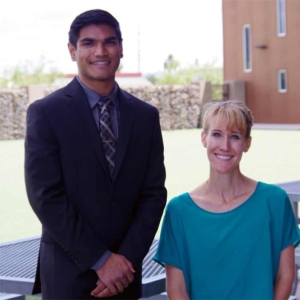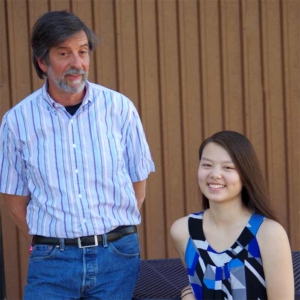One of my favorite things to do at performances, shows, or talks, is to turn around and look at the faces in the audience. BASIS.ed Senior Projects is one of those events where, when I turned around, I am greeted with nothing but smiles of serene bliss: those smiles that so uniquely capture pride, respect, excitement, and hope; those of witnessing something truly incredible.
Last spring, many faculty and staff members from BASIS.ed and our other entities had the lucky pleasure of traveling to or within Arizona to witness the annual Senior Project presentations delivered by participating BASIS.ed graduating seniors.
It was, in a word, spectacular.
Getting the chance to peek in on the last hurrah of BASIS.ed seniors’ educational journey was so profoundly moving – from the standpoint of witnessing the pride that our students, families, and teachers shared over this long term, deep inquiry-based project that seniors spend the last third of their last year doing. But it was also moving in how it represents what the curriculum-diploma (PDF) and educational program stands for as a whole, what it is that grows and nurtures such incredible people. It was an amazing reminder of why we wake up each day excited to head to our jobs, no matter which campus, and regardless of whether we actually have graduating seniors.
Coming to work knowing that I have any small hand in developing students into the scholars we saw before us in Arizona means that I am part of something big – and I am proud of it.
The Student as the Embodiment of the Curriculum
What BASIS.ed schools teach and what students end up prepared to do afterwards is most certainly big, but it is not loud. Sitting in the presentations, it struck me that we are quietly incubating the next leaders in every field imaginable, including disciplines that have yet to emerge.

Something my colleagues and I noticed is that the silence of our students was almost as a telling as what they actually said. The students were not afraid to take a minute, think, and respond to a particularly challenging question by saying things like, “I do not have enough information to comment.” Our curriculum teaches students to tackle the unknown with gusto, to be unafraid to come to student hours or peer tutoring hours because there is something they don’t know. Without fail, students were fearless when confronted with something they did not know.
Projects covering seemingly distinct fields like biology or medical sciences, ended up being highly interdisciplinary, and our students readily shared the connections they uncovered through their research process. The BASIS.ed curriculum is unique in the sense that it gives students the opportunity and capacity to think in an interdisciplinary fashion through specific courses like Connections, Latin, logic, or economics, to name a few, but also gives them deep content level preparation to be able to actually act on their ideas and profoundly understand those interdisciplinary connections. You might find at other schools students who “don’t go there” with a certain project because they were never taught a specific topic, didn’t take “that class,” or don’t have the requisite research skills. Such issues don’t stop our students from making connections or tackling something that will call upon a discipline they haven’t studied. One student, Casey Calhoun, decided to focus her project on better understanding her autistic younger brother by coding and decoding his speech. The BASIS.ed curriculum encompasses many things, but not linguistics (although there could be some Capstone Courses or electives that touch upon linguistics offered at some schools). Though without the proper linguistics foundation, she had the confidence in herself academically to teach herself and work with her mentor on the skills she needed. Her discoveries have led to changes in her brother’s treatment plan, and if you are curious, she is studying Astrophysics at Stanford University this fall. Our curriculum teaches students – and they truly embody – that there are no limits to what you can do if you believe you can do it… even if you just study Astrophysics in the end.
The Student Becomes the Teacher
If you have ever been to an informational event to learn more about our schools, read our website, or are a parent of a BASIS.ed student, it’s no secret that we emphasize the importance of our teachers and the bond between teacher and student as fundamental to our students’ success. The student-teacher relationship comes full circle at the Senior Project presentations. With teachers and mentors as their audience, the students themselves became the teachers, standing before a captive audience, delivering their material with the same exuberance that they had been on the receiving end of for years. They say that imitation is the most sincere form of flattery – and in this case, I can imagine that, for a teacher, there is nothing more sincerely satisfying than watching your student reflect back to you the energy and passion that you tried so hard to convey daily in your lessons. To any teachers reading this who might be wondering what it will “look like” when their rowdy 7th graders, wrapping their heads around logical reasoning, reach 12th grade: if Senior Projects can be seen as any sort of crystal ball, trust me, it looks really good, and your work is going to pay off! They will carry your passion with them – and long after they complete their Senior Project. (Don’t be surprised if they want to stay in touch, as well!)
The Student as the Change Agent
The “hope” part of my own smile of serene bliss was due to the startling realization that these students smash all notions of complacency or apathy I sometimes worry have crept their way into the consciousness of youth culture.

Every single student whose project I sat in on was questioning something pretty big – questioning things that 17-year-olds don’t typically question, like a truth written in a textbook or something seemingly innocuous we do without thinking, such as voting for or against municipal initiatives during local elections.
Side note: a student named Christian Schmidt and another named Sophia Silva, together made me and another colleague vow to get more involved in local politics. If you saw their presentations, you would get more involved, too. By the way, most of the students focusing on something political for their project can’t even vote yet.
“Hope” might not be the right word for what I felt watching these 17- and 18-year-olds poke holes in everything I thought I knew about politics, or remind me of the fact that I would never think to ask the doctor what type of sutures I would be receiving should I ever need them. No, I didn’t quite feel “hope for the future” watching them. Their findings, hunger, and drive did not strike me as future-oriented. Perhaps without them even knowing it, they are already powerful change-agents. The students I met took a present-day challenge, and tried to figure out, here and now, what they could do about it, and convince others (quite adeptly) why it matters.
A better word for what I felt watching the students is “relief.” I felt relief knowing that we, as the adults either directly or indirectly responsible for getting them ready to face a world without Communication Journals, mandatory student hours, and built-in networks of support, are doing a pretty good job giving them skills that will help them in college or a conference room, each with lots of people spouting lots of opinions. I felt relief knowing that 17-year-olds care enough about supporting their peers that they would build an entire app around study collaboration (Trevor Sharp, we can’t wait to see where you go with it!) And I felt relief knowing that there is truly nothing standing in the way of our students’ success.
What is actually behind each of those “smiles of serene bliss” I witnessed as I turned to scan the crowd at the Senior Project presentations is undoubtedly different for everyone who was there. But the feelings are positive because our students are purposeful. They fit into this world – very well – and we’re all lucky for it.
- New Arts Enrichment Program Coming to BASIS Curriculum Schools BASIS Phoenix Central Will Launch the Program for the 2019-2020 School Year - October 12, 2018
- The Student Becomes the Teacher Why Senior Projects Are Spectacular - September 5, 2016
- BASIS.ed in BuzzFeed (And How To Fall In Love With School Again) - May 27, 2016
- The Art and Science of Teaching - April 19, 2016
- A Day in the Life of a 5th Grade Bobcat - April 19, 2016
- Teacher Training 101 - October 1, 2015